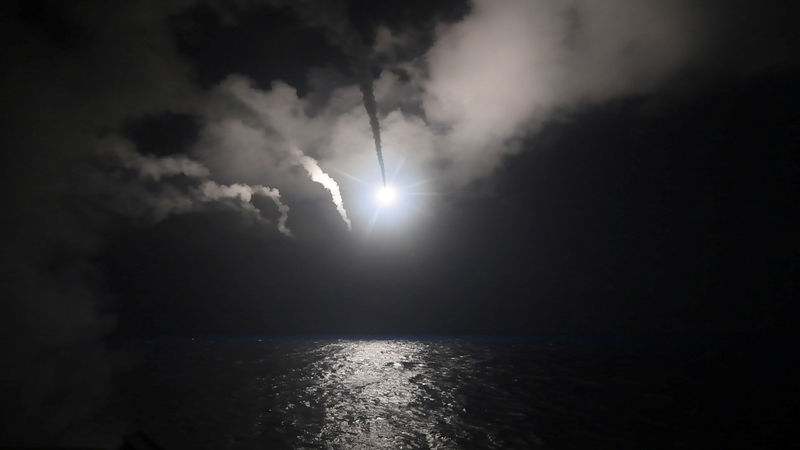By Chris Francescani and Bernie Woodall
NEW YORK/FORT LAUDERDALE, Fla. (Reuters) - For many supporters of U.S. President Donald Trump, his decision to bomb a Syrian airfield in retaliation for a poison gas attack was a decisive show of strength and resolve - just what they voted for in November.
In interviews with more than a dozen Trump voters, many acknowledged that getting the U.S. military directly involved in the Syrian conflict was a far cry from the "America First" isolationism the Republican candidate espoused during the campaign.
Unlike several prominent far-right backers who denounced Thursday's air strikes in Syria , most of the Trump voters interviewed in Texas, Florida and New York on Friday said the attack was not an abdication of his commitment to put U.S. interests above all others.
"Love it, love it, love it, love it. He said from Day One that he's not going to take any nonsense," Anthony Calvanese, 28, a construction foreman, told a reporter on a sidewalk in New York City's Staten Island borough. "He needs to start showing our superiority in the world."
Trump's order came despite his vow in the 2016 campaign to avoid entanglements in Middle East conflicts. Four years ago, he also admonished his predecessor, Democrat Barack Obama, to refrain from retaliating after the Syrian government launched a poison gas attack on its own citizens.
The apparent ideological inconsistencies angered some of Trump's staunchest supporters on the far right.
Paul Joseph Watson, a London-based editor at Infowars, a U.S. media outlet praised by Trump that promotes unsubstantiated conspiracy theories, declared on Twitter he was "OFF the Trump train."
Self-described white nationalist leader Richard Spencer called Trump's decision a "betrayal" and the "end of America First."
By contrast, several Trump voters said they still trusted the president to deliver on his promises.
Todd Recknagel, a 53-year-old managing partner of a private equity firm in Panama City Beach, Florida, said the move reinforced his support for Trump because it showed the president is willing to adjust his thinking based on events.
"I appreciate the fact that he's not so inwardly focused that he's willing to stand up for principle on something like Syria," he said in a phone interview.
"(Ronald) Reagan wouldn't allow that stuff either," he said, referring to the 1980s president revered by Republicans.
Some Trump backers said he had no choice but to act given the horror of Tuesday's poison gas attack.
"If we allowed this to go by, we would be as bad as those who stood by and did nothing as Hitler marched across Europe" in World War 2, Tom Harney, 64, a yacht broker from Lauderhill, Florida, said outside a diner in Fort Lauderdale.
That sentiment was echoed by Joseph Mure Jr., a lawyer who practices in Brooklyn.
"They murdered innocents: women, babies, children," he told a reporter after exiting a Staten Island courthouse. "How many bombs did we drop on Syria? I wish we'd dropped twice that amount." U.S. warships in the Mediterranean Sea launched dozens of Tomahawk missiles at the airfield.
Others said Trump, who cultivated a tough image during the campaign and promised to strengthen the American military, was demonstrating that the United States remains the world's leader.
"We're no longer leading from behind," said Art Tillberg, 67, of Coral Springs, Florida, referring to a phrase Republicans used to criticize Obama's 2011 efforts to oust Libyan leader Muammar Gaddafi.
Still, not all Trump voters agreed with the missile strike, echoing objections from some on the far right that it ran counter to his campaign promises.
Anthony Sage, a 42-year-old retired Army staff sergeant, said the attack undermined Trump's "America First" message.
"The strike is a waste of American time and money," Sage, who said he served tours of duty in Iraq and Afghanistan, said on Friday outside the Fort Hood Army base in Killeen, Texas. "We should be taking care of people here in America first."
Abdi Mohamed, a 23-year-old Somali immigrant from St. Paul, Minnesota, who voted for Trump in November, said the move showed the president was abandoning his outsider instincts in favor of following the advice of the political establishment.
"He was against military action in Syria, but now it seems more and more he is becoming a bit of a cog in the system," Mohamed said in a phone interview.
A few Trump voters found themselves torn: wary of the decision to embroil the United States in Syria's six-year civil war but unwilling to abandon the president they elected.
"I'm kind of on the fence," said Melanie Groves, 39, a small business owner in Louisville, Illinois, who organized a pro-Trump rally last month.

"Best-case scenario, this would be a strong message that this red line has been crossed," she said in a phone interview. "Worst-case scenario, there are a lot of conspiracy theorists that think we are headed towards World War 3."